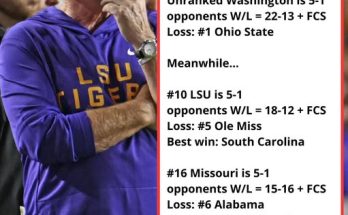In the wake of a disappointing 2024 season, former Dallas Cowboys wide receiver Dez Bryant has been vocal about the need for the team to break free from its traditional approaches and embrace significant changes. Bryant, who played for the Cowboys from 2010 to 2017, has expressed concerns about the organization’s commitment to future success and has called for a cultural shift within the franchise.
A Season of Setbacks
The 2024 NFL season was challenging for the Dallas Cowboys. After three consecutive 12-5 seasons, the team stumbled to a 7-10 record, missing the playoffs and raising questions about the direction of the franchise. The mid-season injury to star quarterback Dak Prescott further compounded the team’s struggles, leading to increased scrutiny of the coaching staff and management decisions.
Bryant’s Critique of Coaching Decisions
One of the most controversial moves of the offseason was the promotion of offensive coordinator Brian Schottenheimer to head coach, following the departure of Mike McCarthy. Bryant did not mince words regarding this decision. In an interview, he stated, “They’re not serious about the future in the next 2-3 years… I felt like last year the Cowboys were rebuilding. They proved me right.”
Bryant’s skepticism reflects a broader concern about the team’s leadership and its ability to make bold decisions necessary for success. He has been particularly critical of what he perceives as a reluctance to step outside the organization’s comfort zone.
Advocacy for Deion Sanders
In his calls for change, Bryant has advocated for the consideration of Deion Sanders, a former Cowboys star and current University of Colorado head coach, as a potential leader for the team. Bryant believes that Sanders’ leadership could bring a much-needed cultural shift to the organization. He expressed his support by stating, “I hope Deion Sanders gets the Cowboys coaching job!”
This suggestion underscores Bryant’s belief that the Cowboys need to embrace innovative leadership to revitalize the team’s performance and culture.
A Call for Cultural Transformation
Beyond coaching changes, Bryant has emphasized the need for a broader cultural transformation within the Cowboys organization. He has been vocal about the importance of moving away from entrenched practices and embracing a more progressive approach to team management and operations.
Bryant’s critiques are not just about specific decisions but about the overall mindset of the organization. He has called for the team to “clean house” and make significant changes to its approach, reflecting his belief that the current strategies are insufficient for achieving success.
The Importance of Stepping Outside the Comfort Zone
Bryant’s call for the Cowboys to step outside their comfort zone is rooted in the belief that innovation and adaptability are crucial for success in the modern NFL. He argues that the team’s adherence to traditional methods and reluctance to embrace change have hindered its performance.
By advocating for new leadership and a cultural shift, Bryant is urging the organization to take risks and explore new strategies that could lead to improved performance on the field.
Looking Ahead
As the Cowboys prepare for the upcoming season, the organization’s response to Bryant’s critiques and suggestions will be pivotal. Embracing change and stepping outside the comfort zone may be challenging, but it could be the key to revitalizing the team’s fortunes and achieving sustained success.
Bryant’s insights, shaped by his years of experience with the team, offer a valuable perspective on the changes needed to navigate the evolving landscape of the NFL. Whether the organization will heed his advice and implement the necessary transformations remains to be seen.
Cowboys Legend Dez Bryant Urges the Team to Step Outside Its Comfort Zone
In the wake of a disappointing 2024 NFL season, former Dallas Cowboys wide receiver Dez Bryant has been vocal about the need for the team to break free from its traditional approaches and embrace significant changes. Bryant, who played for the Cowboys from 2010 to 2017, has expressed concerns about the organization’s commitment to future success and has called for a cultural shift within the franchise.
A Season of Setbacks
The 2024 NFL season proved to be a challenging one for the Dallas Cowboys. After three consecutive 12-5 seasons, the team stumbled to a 7-10 record, missing the playoffs and raising questions about the direction of the franchise. The mid-season injury to star quarterback Dak Prescott further compounded the team’s struggles, leading to increased scrutiny of the coaching staff and management decisions.
With an underwhelming performance on both sides of the ball, the Cowboys failed to meet expectations. Their once-potent offense struggled with consistency, and their defense, which had been dominant in previous years, showed cracks. The disappointing season reignited concerns about the team’s leadership and overall strategy.
Bryant’s Critique of Coaching Decisions
One of the most controversial moves of the offseason was the promotion of offensive coordinator Brian Schottenheimer to head coach, following the departure of Mike McCarthy. Bryant did not mince words regarding this decision. In an interview, he stated, “They’re not serious about the future in the next 2-3 years… I felt like last year the Cowboys were rebuilding. They proved me right.”
Bryant’s skepticism reflects a broader concern about the team’s leadership and its ability to make bold decisions necessary for success. He has been particularly critical of what he perceives as a reluctance to step outside the organization’s comfort zone.
Advocacy for Deion Sanders
In his calls for change, Bryant has advocated for the consideration of Deion Sanders, a former Cowboys star and current University of Colorado head coach, as a potential leader for the team. Bryant believes that Sanders’ leadership could bring a much-needed cultural shift to the organization. He expressed his support by stating, “I hope Deion Sanders gets the Cowboys coaching job!”
Sanders, a Hall of Fame cornerback and a two-time Super Bowl champion, has demonstrated an ability to turn around programs, as seen with his work at Jackson State and Colorado. His dynamic leadership, ability to recruit talent, and deep understanding of the game make him an intriguing candidate in the eyes of many, including Bryant.
This suggestion underscores Bryant’s belief that the Cowboys need to embrace innovative leadership to revitalize the team’s performance and culture. However, despite his endorsement, Jerry Jones and the Cowboys’ front office have shown no public interest in considering Sanders for the role.
A Call for Cultural Transformation
Beyond coaching changes, Bryant has emphasized the need for a broader cultural transformation within the Cowboys organization. He has been vocal about the importance of moving away from entrenched practices and embracing a more progressive approach to team management and operations.
Bryant’s critiques are not just about specific decisions but about the overall mindset of the organization. He has called for the team to “clean house” and make significant changes to its approach, reflecting his belief that the current strategies are insufficient for achieving success.
The Cowboys’ brand has long been associated with talent, prestige, and high expectations, but their postseason struggles over the past two decades have been a major source of frustration for players and fans alike. Bryant’s comments suggest that he believes the team is stuck in a cycle of mediocrity, unwilling to take the risks necessary to achieve long-term success.
The Importance of Stepping Outside the Comfort Zone
Bryant’s call for the Cowboys to step outside their comfort zone is rooted in the belief that innovation and adaptability are crucial for success in the modern NFL. He argues that the team’s adherence to traditional methods and reluctance to embrace change have hindered its performance.
For instance, the Cowboys have historically leaned on big-name acquisitions and marquee signings while neglecting long-term development. While star players like Micah Parsons and CeeDee Lamb have flourished, the team has lacked depth in key positions, which was exposed during the 2024 season.
Moreover, the coaching philosophy has been criticized for being too conservative, particularly in critical moments. Many analysts and former players, including Bryant, believe that the team needs to adopt a more aggressive and creative approach to coaching and player development.
The Dak Prescott Factor
A major question surrounding the Cowboys’ future is the status of quarterback Dak Prescott. While Prescott has been a reliable starter since taking over in 2016, he has yet to lead the team to a deep playoff run. Injuries have also been a concern, and with his contract situation looming, the Cowboys will have to decide whether he remains their long-term solution at quarterback.
Bryant has been a supporter of Prescott in the past but has also acknowledged that the team needs to provide him with the right environment to succeed. Whether that involves bolstering the offensive line, finding a more dynamic play-caller, or even exploring other options at quarterback remains to be seen.
Looking Ahead
As the Cowboys prepare for the upcoming season, the organization’s response to Bryant’s critiques and suggestions will be pivotal. Embracing change and stepping outside the comfort zone may be challenging, but it could be the key to revitalizing the team’s fortunes and achieving sustained success.
Bryant’s insights, shaped by his years of experience with the team, offer a valuable perspective on the changes needed to navigate the evolving landscape of the NFL. Whether the organization will heed his advice and implement the necessary transformations remains to be seen.
In a league where innovation and adaptability are often the difference between success and failure, the Cowboys must decide whether they are willing to take the risks necessary to return to prominence. If they continue to play it safe, they may find themselves stuck in the same cycle of disappointment that has plagued them for nearly three decades.

